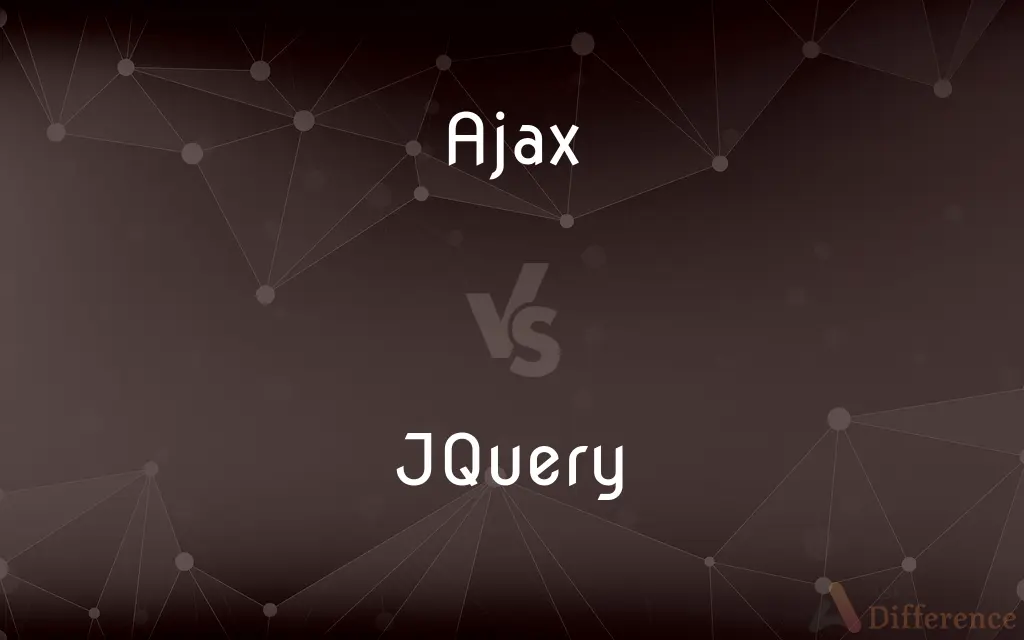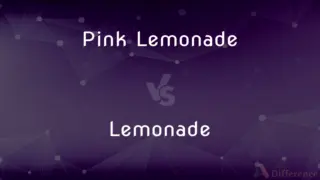Ajax vs. JQuery — What's the Difference?
By Tayyaba Rehman — Published on November 7, 2023
Ajax is a technique for creating dynamic web content asynchronously; JQuery is a JavaScript library simplifying scripting.

Difference Between Ajax and JQuery
Table of Contents
ADVERTISEMENT
Key Differences
Ajax refers to "Asynchronous JavaScript and XML." It's a technique that allows web pages to retrieve and send data to a server asynchronously, without reloading the entire page. On the other hand, JQuery is a fast, small, and feature-rich JavaScript library. While Ajax is a methodology for fetching data, JQuery provides the tools and shortcuts to implement various web functionalities, including Ajax.
Ajax plays a pivotal role in enhancing the user experience on websites by making them more responsive. Instead of reloading the entire page, only parts of it get updated, thanks to Ajax. JQuery, meanwhile, makes it easier for developers to write complex JavaScript functionalities by offering a simplified syntax and various built-in functions, one of which aids in implementing Ajax calls.
An essential point to understand is that Ajax isn't exclusive to JQuery. Ajax can be implemented in pure JavaScript or other libraries. However, JQuery has made Ajax implementation simpler and more intuitive, resulting in its widespread use in web applications.
While Ajax focuses solely on asynchronous web interactions, JQuery has a broader scope. JQuery offers functionalities that handle events, create animations, manipulate the Document Object Model (DOM), and much more. In essence, while Ajax is about asynchronous data exchange, JQuery is a comprehensive toolset for enhancing and easing JavaScript web development.
Comparison Chart
Definition
A technique for asynchronous web content
A JavaScript library
ADVERTISEMENT
Primary Use
Asynchronous data exchange
Simplifying scripting and DOM manipulation
Dependency
Can be implemented with or without JQuery
Does not rely on Ajax but can facilitate Ajax calls
Scope
Solely for asynchronous interactions
Broad functionalities including events, animations, etc.
Relationship
Methodology
Toolset to implement various web functionalities including Ajax
Compare with Definitions
Ajax
Technique for asynchronous data fetch.
Ajax allows for real-time data updates on the dashboard.
JQuery
A JavaScript library simplifying scripting.
With JQuery, the developer wrote fewer lines of code.
Ajax
Web development tool for dynamic content.
Using Ajax, the chat application was more responsive.
JQuery
A library offering event handling and animation.
Animations were smoother and more consistent with JQuery.
Ajax
A combination of JavaScript and XML for data exchange.
Ajax ensured the form data was submitted without page reload.
JQuery
A cross-platform script making JavaScript consistent across browsers.
Thanks to JQuery, the website looked consistent in different browsers.
Ajax
A method for updating web content without refreshing the page.
With Ajax, the website updated its content seamlessly.
JQuery
Tool for easier DOM manipulation.
JQuery made it simple to change the webpage content dynamically.
Ajax
A client-side script enhancing web interactivity.
Through Ajax, users could interact with the site in real time.
JQuery
Framework with a concise syntax for complex tasks.
Implementing the slider was straightforward using JQuery.
Ajax
The son of Telamon of Salamis and a warrior of great stature and prowess who fought against Troy.
Ajax
The son of Ileus of Locris and a warrior of small stature and arrogant character who fought against Troy.
Ajax
(Polari) Nearby, over there
Ajax
A toilet.
Ajax
(poker slang) An ace and a jack as a starting hand in Texas hold 'em.
Ajax
A mythical Greek hero; a warrior who fought against Troy in the Iliad
Common Curiosities
Can Ajax be used without JQuery?
Yes, Ajax can be implemented using pure JavaScript or other libraries.
Is Ajax a programming language?
No, Ajax is a technique or methodology, not a programming language.
How does JQuery relate to JavaScript?
JQuery is a library built on JavaScript, offering simplified syntax and additional functions.
What are the main features of JQuery?
JQuery offers DOM manipulation, event handling, animations, and facilitates easier Ajax implementation.
Why do developers prefer JQuery?
Developers favor JQuery for its simplicity, cross-browser compatibility, and extensive features.
Is Ajax limited to XML data format?
No, while the name suggests XML, Ajax can handle various data formats, including JSON.
What is the primary purpose of JQuery in web development?
JQuery simplifies and streamlines JavaScript scripting, especially tasks like DOM manipulation and event handling.
Are there alternatives to JQuery for implementing Ajax?
Yes, while JQuery offers tools for Ajax, developers can use pure JavaScript or other libraries/frameworks like Axios or Fetch API.
How do Ajax and JQuery enhance web performance?
Ajax reduces page reloads, while JQuery simplifies scripting, both contributing to faster, more efficient web applications.
What is Ajax primarily used for?
Ajax is used for asynchronous web interactions, allowing for dynamic content updates without page reloads.
Can Ajax work with other programming languages besides JavaScript?
Ajax primarily works with JavaScript, but the data it retrieves or sends can be processed by other server-side languages.
Does every web application use JQuery?
No, while JQuery is popular, not every web application uses it; some prefer pure JavaScript or other libraries.
How has Ajax impacted web user experience?
Ajax enhances user experience by making websites more responsive and reducing wait times with asynchronous content loading.
Is JQuery still relevant in modern web development?
Yes, while newer frameworks exist, JQuery remains a popular choice for many web developers.
Can a developer learn Ajax without knowing JQuery?
Absolutely, Ajax can be understood and implemented independently of JQuery.
Share Your Discovery

Previous Comparison
Linoleic Acid vs. Linolenic Acid
Next Comparison
Pink Lemonade vs. LemonadeAuthor Spotlight
Written by
Tayyaba RehmanTayyaba Rehman is a distinguished writer, currently serving as a primary contributor to askdifference.com. As a researcher in semantics and etymology, Tayyaba's passion for the complexity of languages and their distinctions has found a perfect home on the platform. Tayyaba delves into the intricacies of language, distinguishing between commonly confused words and phrases, thereby providing clarity for readers worldwide.













































